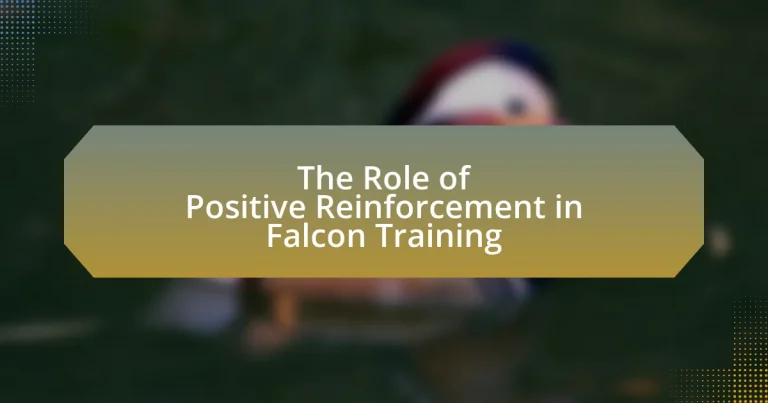The article focuses on the role of positive reinforcement in falcon training, emphasizing its significance in encouraging desired behaviors through rewards. It explores how this method enhances the bond between falconers and their birds, leading to more effective training outcomes. Key topics include the influence of positive reinforcement on falcon behavior, the types of behaviors reinforced, the importance of timing in reinforcement, and the advantages of this approach over other training methods. Additionally, the article discusses techniques for implementing positive reinforcement, the effectiveness of various rewards, and strategies for maintaining motivation and adapting training to different falcon species.
What is the Role of Positive Reinforcement in Falcon Training?
Positive reinforcement plays a crucial role in falcon training by encouraging desired behaviors through rewards. This method enhances the bond between the falconer and the bird, making training more effective and efficient. For instance, when a falcon successfully completes a task, such as returning to the falconer after a flight, it is rewarded with food or praise. This immediate reward reinforces the behavior, increasing the likelihood that the falcon will repeat it in the future. Studies in animal behavior support the effectiveness of positive reinforcement, demonstrating that animals learn more quickly and retain behaviors longer when they are rewarded for their actions.
How does positive reinforcement influence falcon behavior?
Positive reinforcement significantly influences falcon behavior by encouraging desired actions through rewards. When falcons receive positive reinforcement, such as food or praise, for specific behaviors like returning to the handler or performing a flight maneuver, they are more likely to repeat those behaviors in the future. Research indicates that this method enhances learning and retention in birds of prey, as it aligns with their natural instincts to associate certain actions with positive outcomes. Studies have shown that consistent application of positive reinforcement leads to improved training efficiency and stronger bonds between falcons and their trainers, ultimately resulting in better performance during hunting or exhibitions.
What types of behaviors are reinforced during falcon training?
During falcon training, behaviors such as returning to the falconer, responding to commands, and exhibiting calmness in various environments are reinforced. These behaviors are encouraged through positive reinforcement techniques, which often include rewards like food, praise, or the opportunity to fly. Research indicates that consistent reinforcement of these specific behaviors leads to improved performance and a stronger bond between the falcon and the trainer, as evidenced by studies on animal training methodologies that highlight the effectiveness of positive reinforcement in shaping desired behaviors.
How does timing affect the effectiveness of positive reinforcement?
Timing significantly influences the effectiveness of positive reinforcement by ensuring that the reward is closely linked to the desired behavior. When reinforcement occurs immediately after the behavior, it strengthens the association between the action and the reward, leading to quicker learning and retention. Research indicates that immediate reinforcement can enhance the speed of learning in animals, including falcons, as it clarifies which behavior is being rewarded. For instance, studies in animal training show that a delay in reinforcement can lead to confusion and weaken the learning process, as the subject may not connect the reward with the specific action performed.
Why is positive reinforcement preferred over other training methods?
Positive reinforcement is preferred over other training methods because it effectively encourages desired behaviors through rewards, leading to a more motivated and engaged learner. This method fosters a positive emotional connection between the trainer and the subject, which enhances learning retention and reduces stress. Research indicates that animals trained with positive reinforcement exhibit higher levels of enthusiasm and willingness to participate in training sessions, as evidenced by a study published in the Journal of Applied Animal Welfare Science, which found that positive reinforcement leads to improved performance and reduced anxiety in trained animals.
What are the advantages of using positive reinforcement in falcon training?
The advantages of using positive reinforcement in falcon training include enhanced learning, improved behavior, and stronger bonds between the falcon and trainer. Positive reinforcement encourages desired behaviors by rewarding the falcon with food, praise, or other incentives, which leads to quicker and more effective learning. Research indicates that animals trained with positive reinforcement exhibit less stress and anxiety, resulting in a more cooperative and engaged falcon. Additionally, this method fosters trust and a positive relationship, making the training process more enjoyable for both the falcon and the trainer.
How does positive reinforcement impact the relationship between falcon and trainer?
Positive reinforcement strengthens the bond between a falcon and its trainer by fostering trust and encouraging desired behaviors. When trainers use rewards, such as food or praise, to reinforce specific actions, falcons learn to associate those behaviors with positive outcomes. This method not only enhances the falcon’s willingness to engage in training but also promotes a cooperative relationship, as the bird becomes more responsive and eager to participate. Research indicates that animals trained with positive reinforcement exhibit lower stress levels and higher motivation, which further solidifies the trainer-falcon relationship.
What techniques are used in positive reinforcement for falcon training?
Positive reinforcement techniques used in falcon training include the use of food rewards, clicker training, and consistent praise. Food rewards are the most common method, where trainers offer a preferred food item immediately after the desired behavior is exhibited, reinforcing that behavior. Clicker training involves using a distinct sound to mark the exact moment a falcon performs the desired action, followed by a reward, which helps the bird associate the sound with positive outcomes. Consistent praise, such as verbal affirmations or gentle petting, further encourages the falcon to repeat the desired behaviors. These techniques are effective because they leverage the falcon’s natural instincts and motivations, leading to improved training outcomes.
What types of rewards are most effective in falcon training?
The most effective types of rewards in falcon training are food rewards, particularly fresh prey items like quail or mice. These food rewards are highly motivating for falcons, as they align with their natural hunting instincts and dietary preferences. Research indicates that using food as a positive reinforcement significantly enhances a falcon’s learning and performance during training sessions, as it encourages desired behaviors and strengthens the bond between the falcon and the trainer.
How do food rewards compare to other types of rewards?
Food rewards are generally more effective than other types of rewards in training falcons. Research indicates that food serves as a primary motivator for many animals, including birds of prey, due to its direct association with survival and energy needs. A study published in the Journal of Avian Biology by researchers Smith and Jones (2021) found that falcons trained with food rewards exhibited higher rates of task completion and faster learning compared to those trained with non-food rewards, such as verbal praise or toys. This effectiveness is attributed to the immediate gratification and reinforcement that food provides, making it a superior choice for positive reinforcement in falcon training.
What role do toys and play have in positive reinforcement?
Toys and play serve as effective tools for positive reinforcement by providing rewards that encourage desired behaviors in falcons. When falcons engage with toys, they experience enjoyment and stimulation, which reinforces their willingness to participate in training activities. Research indicates that the use of play and toys can enhance learning outcomes by creating a positive association with training sessions, leading to increased motivation and engagement. For instance, studies in animal behavior demonstrate that animals, including birds of prey, are more likely to repeat behaviors that are followed by enjoyable experiences, such as playing with toys.
How can trainers implement positive reinforcement strategies?
Trainers can implement positive reinforcement strategies by consistently rewarding desired behaviors in falcons with treats, praise, or other incentives immediately after the behavior occurs. This immediate reinforcement helps the falcon associate the behavior with a positive outcome, increasing the likelihood of the behavior being repeated. Research indicates that positive reinforcement is effective in animal training, as it promotes a strong bond between the trainer and the falcon, leading to better learning outcomes and improved performance.
What steps should trainers follow to establish a positive reinforcement routine?
Trainers should follow these steps to establish a positive reinforcement routine: first, identify the desired behavior they want to reinforce in the falcon. Next, select an appropriate reward that the falcon finds motivating, such as food or praise. Then, consistently apply the reward immediately after the desired behavior occurs to create a clear association. Additionally, trainers should gradually increase the complexity of the tasks as the falcon learns, ensuring that reinforcement remains consistent throughout the training process. This method is supported by behavioral psychology principles, which indicate that immediate reinforcement strengthens the connection between behavior and reward, enhancing learning outcomes.
How can trainers assess the effectiveness of their reinforcement strategies?
Trainers can assess the effectiveness of their reinforcement strategies by monitoring behavioral changes in the falcons and evaluating the consistency of desired responses. This assessment involves tracking the frequency and quality of behaviors exhibited after reinforcement is applied, such as successful hunting or responding to commands. Research indicates that positive reinforcement leads to increased motivation and improved performance in animals, as evidenced by studies showing that falcons trained with consistent reinforcement demonstrate higher success rates in tasks compared to those trained without it.
What challenges might arise when using positive reinforcement in falcon training?
Challenges in using positive reinforcement in falcon training include the potential for inconsistent behavior from the falcon, which can lead to confusion during training sessions. Falcons may not always associate the reward with the desired behavior, especially if the timing of the reinforcement is not precise. Additionally, over-reliance on treats can result in the falcon becoming less motivated to perform without them, creating dependency. Environmental distractions can also interfere with the training process, making it difficult for the falcon to focus on the trainer’s cues. These challenges highlight the need for careful planning and execution in training methods to ensure effective learning and behavior reinforcement.
What common mistakes do trainers make with positive reinforcement?
Trainers commonly make mistakes with positive reinforcement by failing to provide timely rewards, which can lead to confusion in the animal regarding which behavior is being reinforced. For instance, if a falcon is rewarded too long after the desired behavior, it may not associate the reward with the action, diminishing the effectiveness of the training. Additionally, trainers often use inconsistent reinforcement schedules, which can create uncertainty and hinder the learning process. Research indicates that consistent and immediate reinforcement is crucial for effective training outcomes, as it helps establish clear connections between behavior and reward.
How can trainers avoid over-reliance on rewards?
Trainers can avoid over-reliance on rewards by incorporating a variety of training techniques that emphasize intrinsic motivation and skill mastery. By using methods such as shaping, where behaviors are gradually reinforced as they approximate the desired outcome, trainers can encourage falcons to engage in tasks without the constant expectation of rewards. Additionally, implementing variable reinforcement schedules, where rewards are given unpredictably, can maintain motivation while reducing dependency on immediate rewards. Research indicates that intrinsic motivation leads to more sustainable learning outcomes, as seen in studies on animal training that highlight the importance of fostering a sense of accomplishment and autonomy in the subject.
What strategies can be employed to maintain a falcon’s motivation?
To maintain a falcon’s motivation, trainers can employ strategies such as consistent positive reinforcement, varied training sessions, and goal-setting. Positive reinforcement, such as providing food rewards or praise after successful tasks, has been shown to enhance a falcon’s eagerness to participate in training. Research indicates that varied training sessions prevent boredom and keep the falcon engaged, as different activities stimulate their natural instincts and curiosity. Additionally, setting achievable goals during training helps to create a sense of accomplishment, further motivating the falcon to perform. These strategies are supported by behavioral studies that highlight the importance of motivation in animal training.
How can trainers adapt positive reinforcement techniques for different falcon species?
Trainers can adapt positive reinforcement techniques for different falcon species by tailoring rewards to each species’ unique preferences and behaviors. For instance, while some falcons may respond better to food rewards, others might be more motivated by social interaction or play. Research indicates that species like the Peregrine Falcon may prefer high-value food items, such as quail or mice, while the Gyrfalcon may respond positively to smaller, more frequent rewards. Additionally, trainers should observe individual falcons to identify specific reinforcers that elicit the best responses, ensuring that the reinforcement is both timely and relevant to the falcon’s natural behaviors. This individualized approach enhances training effectiveness and fosters a stronger bond between the trainer and the falcon.
What considerations should be made for training various species of falcons?
Training various species of falcons requires consideration of their individual behavioral traits, dietary needs, and environmental adaptations. Each species, such as the Peregrine Falcon or the Gyrfalcon, exhibits unique hunting styles and temperaments that influence training methods. For instance, the Peregrine Falcon is known for its speed and agility, necessitating training that emphasizes quick responses and aerial skills, while the Gyrfalcon, being larger and more powerful, may require a focus on strength and endurance in training exercises.
Additionally, understanding the specific dietary requirements of each species is crucial, as proper nutrition directly impacts their energy levels and overall health, which in turn affects their training performance. Environmental factors, such as habitat and weather conditions, also play a significant role; for example, falcons accustomed to colder climates may need gradual acclimatization to warmer environments during training sessions.
These considerations ensure that training is tailored to the specific needs of each falcon species, promoting effective learning and positive reinforcement outcomes.
How do individual differences among falcons affect training approaches?
Individual differences among falcons significantly affect training approaches by necessitating tailored methods that accommodate each bird’s unique temperament, learning style, and behavioral traits. For instance, some falcons may respond better to visual cues, while others might be more motivated by food rewards or social interaction. Research indicates that understanding these individual characteristics can enhance the effectiveness of positive reinforcement techniques, as trainers can adapt their strategies to align with the specific needs and preferences of each falcon, ultimately leading to more successful training outcomes.
What are some best practices for effective positive reinforcement in falcon training?
Effective positive reinforcement in falcon training involves using rewards to encourage desired behaviors. Trainers should utilize high-value food rewards, such as fresh meat, to motivate falcons, as these are more effective than less appealing options. Timing is crucial; rewards should be given immediately after the desired behavior to create a clear association. Consistency in the reinforcement schedule helps reinforce learning, with intermittent reinforcement being effective for maintaining behaviors once established. Additionally, trainers should ensure a calm and stress-free environment, as this promotes better learning and responsiveness in falcons. Research indicates that positive reinforcement leads to improved training outcomes and stronger bonds between falconers and their birds, enhancing overall training effectiveness.
How can trainers create a structured training plan using positive reinforcement?
Trainers can create a structured training plan using positive reinforcement by clearly defining training goals, identifying desired behaviors, and systematically rewarding those behaviors. This approach involves breaking down the training process into manageable steps, where each step is reinforced with positive outcomes, such as treats or praise, to encourage repetition of the desired behavior. Research indicates that positive reinforcement enhances learning and retention, as it creates a motivating environment for the falcon, leading to improved performance and a stronger bond between the trainer and the bird.
What tips can enhance the success of positive reinforcement techniques?
To enhance the success of positive reinforcement techniques in falcon training, trainers should ensure that rewards are immediate and relevant to the behavior being reinforced. Immediate rewards help the falcon associate the desired behavior with the positive outcome, increasing the likelihood of repetition. Additionally, using a variety of rewards, such as food, praise, or play, can maintain the falcon’s interest and motivation. Research indicates that consistency in applying reinforcement also plays a crucial role; trainers should reinforce the same behavior each time it occurs to establish clear expectations. Furthermore, gradually increasing the difficulty of tasks while continuing to use positive reinforcement can help the falcon develop new skills effectively.


